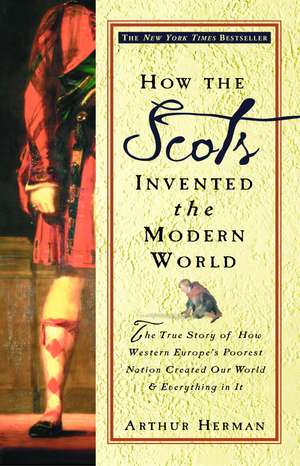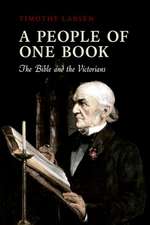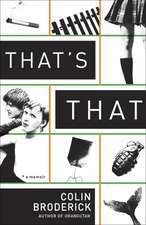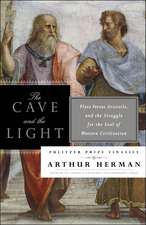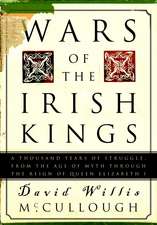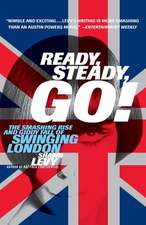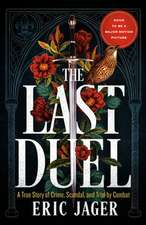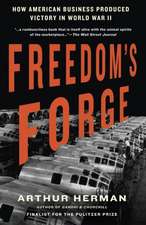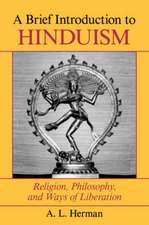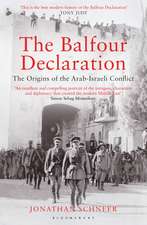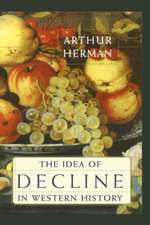How the Scots Invented the Modern World: The True Story of How Western Europe's Poorest Nation Created Our World and Everything in It
Autor Arthur Hermanen Limba Engleză Paperback – 31 aug 2002
Preț: 110.32 lei
Nou
Puncte Express: 165
Preț estimativ în valută:
21.11€ • 21.96$ • 17.43£
21.11€ • 21.96$ • 17.43£
Carte disponibilă
Livrare economică 24 martie-07 aprilie
Preluare comenzi: 021 569.72.76
Specificații
ISBN-13: 9780609809990
ISBN-10: 0609809997
Pagini: 480
Dimensiuni: 133 x 204 x 26 mm
Greutate: 0.34 kg
Ediția:Pbk.
Editura: BROADWAY BOOKS
ISBN-10: 0609809997
Pagini: 480
Dimensiuni: 133 x 204 x 26 mm
Greutate: 0.34 kg
Ediția:Pbk.
Editura: BROADWAY BOOKS
Notă biografică
ARTHUR HERMAN, author of The Idea of Decline in Western History and Joseph McCarthy: Reexamining the Life and Legacy of America’s Most Hated Senator, received his doctorate in history at Johns Hopkins University. He is the coordinator of the Western Heritage Program at the Smithsonian Institution, an associate professor of history at George Mason University, and a consulting historical editor for Time-Life Books. He lives in Washington, D.C.
From the Hardcover edition.
From the Hardcover edition.
Extras
The New Jerusalem
I
Just as the German Reformation was largely the work of a single individual, Martin Luther, so the Scottish Reformation was the achievement of one man of heroic will and tireless energy: John Knox.
Like Luther, Knox left an indelible mark on his national culture. Uncompromising, dogmatic, and driven, John Knox was a prolific writer and a preacher of truly terrifying power. His early years as a Protestant firebrand had been spent in exile, imprisonment, and even penal servitude chained to a rowing bench in the king's galleys. The harsh trials toughened him physically and spiritually for what was to come. He became John Knox, "he who feared the face of no man." Beginning in 1559, Knox single-handedly inspired, intimidated, and bullied Scotland's nobility and urban classes into overthrowing the Catholic Church of their forebears and adopting the religious creed of Geneva's John Calvin. Its austere and harsh dogmas?that the Bible was the literal Word of God, that the God of that Bible was a stern and jealous God, filled with wrath at all sinners and blasphemers, and that the individual soul was by God's grace predestined to heaven or hell regardless of any good works or charitable intentions?were themselves natural extensions of Knox's own personality. Calvinism seemed as natural to him as breathing, and he taught a generation of Scotsmen to believe the same thing themselves.
Above all, John Knox wanted to turn the Scots into God's chosen people, and Scotland into the New Jerusalem. To do this, Knox was willing to sweep away everything about Scotland's past that linked it to the Catholic Church. As one admirer said, "Others snipped at the branches of Popery; but he strikes at the roots, to destroy the whole." He and his followers scoured away not only Scottish Catholicism but all its physical manifestations, from monasteries and bishops and clerical vestments to holy relics and market-square crosses. They smashed stained-glass windows and saints' statues, ripped out choir stalls and roodscreens, and overturned altars. All these symbols of a centuries-old tradition of religious culture, which we would call great works of art, were for Knox marks of "idolatry" and "the synagogue of Satan," as he called the Roman Catholic Church. In any case, the idols disappeared from southern Scotland, and the Scottish Kirk rose up to take their place.
Knox and his lieutenants also imposed the new rules of the Calvinist Sabbath on Scottish society: no working (people could be arrested for plucking a chicken on Sunday), no dancing, and no playing of the pipes. Gambling, cardplaying, and the theater were banned. No one could move out of a parish without written permission of the minister. The Kirk wiped out all traditional forms of collective fun, such as Carnival, Maytime celebrations, mumming, and Passion plays. Fornication brought punishment and exile; adultery meant death. The church courts, or kirk-sessions, enforced the law with scourges, pillories, branks (a padlocked iron helmet that forced an iron plate into the mouth of a convicted liar or blasphemer), ducking-stools, banishment, and, in the case of witches or those possessed by the devil, burning at the stake.
The faithful received one single compensation for this harsh authoritarian regime, and it was a powerful one: direct access to God. The right of communion, receiving the body and blood of Christ in the form of wine and bread, now belonged to everyone, rich and poor, young and old, men and women. In the Catholic Church, the Bible had been literally a closed book. Now anyone who could read, or listen to someone else read, could absorb the Word of God. On Sundays the church rafters rang with the singing of psalms and recitations from the Gospel. The Lord's Supper became a community festival, with quantities, sometimes plentiful, of red wine and shortcake (John Knox presided over one Sunday communion where the congregation consumed eight and a half gallons of claret).
The congregation was the center of everything. It elected its own board of elders or presbyters; it even chose its minister. The congregation's board of elders, the consistory, cared for the poor and the sick; it fed and clothed the community's orphans. Girls who were too poor to have a dowry to tempt a prospective husband got one from the consistory. It was more than just fear of the ducking-stool or the stake that bound the Kirk together. It was a community united by its commitment to God and its sense of chosenness. "God loveth us," John Knox had written, "because we are His own handiwork."
To a large extent Knox's mission to create the New Jerusalem in Scotland succeeded. The Reformation laid down strong roots in the Scottish Lowlands, that belt of fertile land and river valleys running from the Firth of Clyde and Glasgow in the extreme west to just north of Carlisle and Hadrian's Wall across to Edinburgh and Berwick-on-Tweed in the east. North of this in the beautiful but barren and sparsely populated Highlands, its record was more spotty. But in all the areas that came under his influence, the Kirk created a new society in the image of Knox's utopian ideal. It had turned its back not only on Scotland's past, but on all purely secular values, no matter what the source. Knox made his view clear in one of his last letters before he died in November 1572. "All worldlie strength, yea even in things spiritual, decays, and yet shall never the work of God decay."
One of those pillars of "worldlie strength" that Knox despised was political authority, or more precisely the power of monarchs. Perhaps because Knox's closest allies were Scottish nobles who wanted to see the Scottish monarchy tamed, or because nearly every monarch he dealt with was either a child or a woman (the boy king Edward VI of England, Mary Queen of Scots, the Scottish Regent Mary of Guise, and English queens Mary Tudor and Elizabeth I), he treated them all with impatience and contempt. Yet neither Mary of Guise nor Mary Queen of Scots could do without him. Even though they were Catholics, Knox represented a spiritual authority they needed to legitimize their own. When Queen Mary announced her plans to marry her worthless cousin Lord Darnley, Knox gave her such a fierce public scolding that she burst into tears in full view of her court. She made the mistake of marrying Darnley anyway, and set in motion the series of scandals that would finally push her off the throne. By 1570, Knox recognized that Mary no longer had any part to play in making the New Jerusalem and he swept her aside, like a useless piece from the game board. Her infant son James VI was installed in her place, with George Buchanan, Scotland's leading humanist, as his tutor, so that the boy could be raised in the Presbyterian faith.
Knox and Buchanan believed that political power was ordained by God, but that that power was vested not in kings or in nobles or even in the clergy, but in the people. The Presbyterian covenant with God required them to defend that power against any interloper. Punishing idolatry and destroying tyranny was a sacred duty laid by God on "the whole body of the people," Knox wrote, "and of every man in his vocation."
Here was a vision of politics unlike any other at the time. George Buchanan turned it into a full-fledged doctrine of popular sovereignty, the first in Europe. Buchanan came from Stirlingshire in central Scotland, at a time when it was still much like the Highlands in its culture and character -- in fact, Buchanan grew up speaking both Gaelic and Scots. He studied at the University of St. Andrews and then at the University of Paris alongside other future giants of the Reformation such as John Calvin and Ignatius Loyola, the later founder of the Jesuits. As a Greek and Latin scholar, Buchanan had few peers. But he was also a founding father of Scottish Presbyterianism: he served as Moderator of the Kirk's General Assembly -- the only layman ever to do so -- and helped write the Kirk's First Book of Discipline. His greatest achievement, however, was his book on the nature of political authority, titled The Law of Government Among the Scots, published in 1579.
In it Buchanan asserted that all political authority ultimately belonged to the people, who came together to elect someone, whether a king or a body of magistrates, to manage their affairs. The people were always more powerful than the rulers they created; they were free to remove them at will. "The people," he explained, "have the right to confer the royal authority upon whomever they wish." This is the sort of view we are used to ascribing to John Locke; in fact, it belongs to a Presbyterian Scot from Stirlingshire writing more than a hundred years earlier. And Buchanan went further. When the ruler or rulers failed to act in the people's interest, Buchanan wrote, then each and every citizen, even "the lowest and meanest of men," had the sacred right and duty to resist that tyrant, even to the point of killing him.
Here was a powerful formula for democracy: government of the people and for the people. In the crude circumstances of the late sixteenth century, however, it was also an invitation to anarchy. That was what Scotland got for nearly two decades after Knox's death, until Mary's son, James VI, overturned his old tutor's theories and reasserted the power of the monarchy. The dream of the people as sovereign died. But it would leave its trace within the church itself, in the system of synods peculiar to every parish and province in Scotland. It was the single most democratic system of church government in Europe. Even the minister was chosen by the congregation's consistory of elected elders, instead of by some powerful aristocrat or laird. The elders also sent deputations to their local synod, who in turn sent representatives to the Kirk's General Assembly. This meant that the members of the Kirk's governing body really were representatives of the people, in addition to being enforcers of godly discipline and propagators of the Word of God.
Not surprisingly, a self-governing Kirk coexisted uneasily with monarchs such as the Stuarts, who claimed to rule by divine right. To the Presbyterian, it was still God and His people, not kings, who ruled. Preacher Andrew Melville once even told James VI that Scotland was two realms, not one, and that James as king of the first was also a subject of the second, which belonged to Jesus Christ. During his almost fifty-year reign, James VI (who after the death of Elizabeth Tudor in 1603 also became King James I of England) had the good sense not to force the issue. His son Charles I did not. When Charles finally did try to break the Presbyterian Church to his will, including forcing it to accept the Anglican Book of Common Prayer in its church services, he set off this explosive democratic mixture.
On Sunday, July 23, 1637, the dean of St. Giles in Edinburgh opened his morning service with the new royal prayer book, as King Charles had ordered. As soon as he started, women in the congregation began to shout insults; others threw stools and with loud protests stormed out of the church. The riots that followed over the next several months forced the Bishop of Edinburgh to flee for his life. Inspired by the resistance, ministers, nobles, and ordinary citizens gathered on the last week of February of 1638 to sign a National Convenant.
The National Covenant was more than just a petition or a declaration of faith. It was the Presbyterian version of democracy in action. In the name of true religion, it challenged the king's prerogative to make law without consent, and affirmed that the Scottish people would oppose any change not approved by a free General Assembly and Parliament. Those who signed swore to uphold the faith John Knox had founded, and that "we shall defend the same . . . to the utmost of that power that God hath put into our hands, all the days of our lives."
Bands of signatories carried copies from Edinburgh to neighboring towns and then the rest of the country. Thousands flocked to sign, both men and women, young and old, rich and poor. Ministers led their congregations to sign en masse. "I have seen more than a thousand all at once lifting up their hands," wrote one, "and the tears falling down from their eyes." In the southwest, some were said to have signed the Covenant in their own blood.
By the end of May, the only parts of Scotland that had not signed were the remote western Highlands, the islands north of Argyll, and the shires of Aberdeen and Banff, where the king's most resolute aristocratic supporters, the Gordons, held the balance of political power. The covenanting drive even spread to the Scottish settlements in Ulster, where hundreds signed despite the desperate efforts of royal officials to stop them.
In November the General Assembly in Glasgow declared war on "the kingdom of Satan and Antichrist," meaning Charles and his bishops. The Scots had forced on Charles a war he neither wanted nor could afford. Thousands of volunteers flocked into the Covenanters' army, armed in many cases with little more than hoes and scythes. Yet they managed to best Charles's invading mercenaries and compelled him to sue for peace. The Bishops' War (there were actually two, the second following a brief truce that ended the first) revealed the flimsiness of Stuart rule, and encouraged the Parliament in London to defy Charles in turn. A civil war ensued, which culminated in the king's execution in 1649 and the emergence of Oliver Cromwell as Lord Protector. The English Civil War would destroy forever the facade of absolute monarchy in Britain. A new political ideal, that of government with the consent of the governed, had arrived. But it took its original impulse from the Scottish Covenanters.
I
Just as the German Reformation was largely the work of a single individual, Martin Luther, so the Scottish Reformation was the achievement of one man of heroic will and tireless energy: John Knox.
Like Luther, Knox left an indelible mark on his national culture. Uncompromising, dogmatic, and driven, John Knox was a prolific writer and a preacher of truly terrifying power. His early years as a Protestant firebrand had been spent in exile, imprisonment, and even penal servitude chained to a rowing bench in the king's galleys. The harsh trials toughened him physically and spiritually for what was to come. He became John Knox, "he who feared the face of no man." Beginning in 1559, Knox single-handedly inspired, intimidated, and bullied Scotland's nobility and urban classes into overthrowing the Catholic Church of their forebears and adopting the religious creed of Geneva's John Calvin. Its austere and harsh dogmas?that the Bible was the literal Word of God, that the God of that Bible was a stern and jealous God, filled with wrath at all sinners and blasphemers, and that the individual soul was by God's grace predestined to heaven or hell regardless of any good works or charitable intentions?were themselves natural extensions of Knox's own personality. Calvinism seemed as natural to him as breathing, and he taught a generation of Scotsmen to believe the same thing themselves.
Above all, John Knox wanted to turn the Scots into God's chosen people, and Scotland into the New Jerusalem. To do this, Knox was willing to sweep away everything about Scotland's past that linked it to the Catholic Church. As one admirer said, "Others snipped at the branches of Popery; but he strikes at the roots, to destroy the whole." He and his followers scoured away not only Scottish Catholicism but all its physical manifestations, from monasteries and bishops and clerical vestments to holy relics and market-square crosses. They smashed stained-glass windows and saints' statues, ripped out choir stalls and roodscreens, and overturned altars. All these symbols of a centuries-old tradition of religious culture, which we would call great works of art, were for Knox marks of "idolatry" and "the synagogue of Satan," as he called the Roman Catholic Church. In any case, the idols disappeared from southern Scotland, and the Scottish Kirk rose up to take their place.
Knox and his lieutenants also imposed the new rules of the Calvinist Sabbath on Scottish society: no working (people could be arrested for plucking a chicken on Sunday), no dancing, and no playing of the pipes. Gambling, cardplaying, and the theater were banned. No one could move out of a parish without written permission of the minister. The Kirk wiped out all traditional forms of collective fun, such as Carnival, Maytime celebrations, mumming, and Passion plays. Fornication brought punishment and exile; adultery meant death. The church courts, or kirk-sessions, enforced the law with scourges, pillories, branks (a padlocked iron helmet that forced an iron plate into the mouth of a convicted liar or blasphemer), ducking-stools, banishment, and, in the case of witches or those possessed by the devil, burning at the stake.
The faithful received one single compensation for this harsh authoritarian regime, and it was a powerful one: direct access to God. The right of communion, receiving the body and blood of Christ in the form of wine and bread, now belonged to everyone, rich and poor, young and old, men and women. In the Catholic Church, the Bible had been literally a closed book. Now anyone who could read, or listen to someone else read, could absorb the Word of God. On Sundays the church rafters rang with the singing of psalms and recitations from the Gospel. The Lord's Supper became a community festival, with quantities, sometimes plentiful, of red wine and shortcake (John Knox presided over one Sunday communion where the congregation consumed eight and a half gallons of claret).
The congregation was the center of everything. It elected its own board of elders or presbyters; it even chose its minister. The congregation's board of elders, the consistory, cared for the poor and the sick; it fed and clothed the community's orphans. Girls who were too poor to have a dowry to tempt a prospective husband got one from the consistory. It was more than just fear of the ducking-stool or the stake that bound the Kirk together. It was a community united by its commitment to God and its sense of chosenness. "God loveth us," John Knox had written, "because we are His own handiwork."
To a large extent Knox's mission to create the New Jerusalem in Scotland succeeded. The Reformation laid down strong roots in the Scottish Lowlands, that belt of fertile land and river valleys running from the Firth of Clyde and Glasgow in the extreme west to just north of Carlisle and Hadrian's Wall across to Edinburgh and Berwick-on-Tweed in the east. North of this in the beautiful but barren and sparsely populated Highlands, its record was more spotty. But in all the areas that came under his influence, the Kirk created a new society in the image of Knox's utopian ideal. It had turned its back not only on Scotland's past, but on all purely secular values, no matter what the source. Knox made his view clear in one of his last letters before he died in November 1572. "All worldlie strength, yea even in things spiritual, decays, and yet shall never the work of God decay."
One of those pillars of "worldlie strength" that Knox despised was political authority, or more precisely the power of monarchs. Perhaps because Knox's closest allies were Scottish nobles who wanted to see the Scottish monarchy tamed, or because nearly every monarch he dealt with was either a child or a woman (the boy king Edward VI of England, Mary Queen of Scots, the Scottish Regent Mary of Guise, and English queens Mary Tudor and Elizabeth I), he treated them all with impatience and contempt. Yet neither Mary of Guise nor Mary Queen of Scots could do without him. Even though they were Catholics, Knox represented a spiritual authority they needed to legitimize their own. When Queen Mary announced her plans to marry her worthless cousin Lord Darnley, Knox gave her such a fierce public scolding that she burst into tears in full view of her court. She made the mistake of marrying Darnley anyway, and set in motion the series of scandals that would finally push her off the throne. By 1570, Knox recognized that Mary no longer had any part to play in making the New Jerusalem and he swept her aside, like a useless piece from the game board. Her infant son James VI was installed in her place, with George Buchanan, Scotland's leading humanist, as his tutor, so that the boy could be raised in the Presbyterian faith.
Knox and Buchanan believed that political power was ordained by God, but that that power was vested not in kings or in nobles or even in the clergy, but in the people. The Presbyterian covenant with God required them to defend that power against any interloper. Punishing idolatry and destroying tyranny was a sacred duty laid by God on "the whole body of the people," Knox wrote, "and of every man in his vocation."
Here was a vision of politics unlike any other at the time. George Buchanan turned it into a full-fledged doctrine of popular sovereignty, the first in Europe. Buchanan came from Stirlingshire in central Scotland, at a time when it was still much like the Highlands in its culture and character -- in fact, Buchanan grew up speaking both Gaelic and Scots. He studied at the University of St. Andrews and then at the University of Paris alongside other future giants of the Reformation such as John Calvin and Ignatius Loyola, the later founder of the Jesuits. As a Greek and Latin scholar, Buchanan had few peers. But he was also a founding father of Scottish Presbyterianism: he served as Moderator of the Kirk's General Assembly -- the only layman ever to do so -- and helped write the Kirk's First Book of Discipline. His greatest achievement, however, was his book on the nature of political authority, titled The Law of Government Among the Scots, published in 1579.
In it Buchanan asserted that all political authority ultimately belonged to the people, who came together to elect someone, whether a king or a body of magistrates, to manage their affairs. The people were always more powerful than the rulers they created; they were free to remove them at will. "The people," he explained, "have the right to confer the royal authority upon whomever they wish." This is the sort of view we are used to ascribing to John Locke; in fact, it belongs to a Presbyterian Scot from Stirlingshire writing more than a hundred years earlier. And Buchanan went further. When the ruler or rulers failed to act in the people's interest, Buchanan wrote, then each and every citizen, even "the lowest and meanest of men," had the sacred right and duty to resist that tyrant, even to the point of killing him.
Here was a powerful formula for democracy: government of the people and for the people. In the crude circumstances of the late sixteenth century, however, it was also an invitation to anarchy. That was what Scotland got for nearly two decades after Knox's death, until Mary's son, James VI, overturned his old tutor's theories and reasserted the power of the monarchy. The dream of the people as sovereign died. But it would leave its trace within the church itself, in the system of synods peculiar to every parish and province in Scotland. It was the single most democratic system of church government in Europe. Even the minister was chosen by the congregation's consistory of elected elders, instead of by some powerful aristocrat or laird. The elders also sent deputations to their local synod, who in turn sent representatives to the Kirk's General Assembly. This meant that the members of the Kirk's governing body really were representatives of the people, in addition to being enforcers of godly discipline and propagators of the Word of God.
Not surprisingly, a self-governing Kirk coexisted uneasily with monarchs such as the Stuarts, who claimed to rule by divine right. To the Presbyterian, it was still God and His people, not kings, who ruled. Preacher Andrew Melville once even told James VI that Scotland was two realms, not one, and that James as king of the first was also a subject of the second, which belonged to Jesus Christ. During his almost fifty-year reign, James VI (who after the death of Elizabeth Tudor in 1603 also became King James I of England) had the good sense not to force the issue. His son Charles I did not. When Charles finally did try to break the Presbyterian Church to his will, including forcing it to accept the Anglican Book of Common Prayer in its church services, he set off this explosive democratic mixture.
On Sunday, July 23, 1637, the dean of St. Giles in Edinburgh opened his morning service with the new royal prayer book, as King Charles had ordered. As soon as he started, women in the congregation began to shout insults; others threw stools and with loud protests stormed out of the church. The riots that followed over the next several months forced the Bishop of Edinburgh to flee for his life. Inspired by the resistance, ministers, nobles, and ordinary citizens gathered on the last week of February of 1638 to sign a National Convenant.
The National Covenant was more than just a petition or a declaration of faith. It was the Presbyterian version of democracy in action. In the name of true religion, it challenged the king's prerogative to make law without consent, and affirmed that the Scottish people would oppose any change not approved by a free General Assembly and Parliament. Those who signed swore to uphold the faith John Knox had founded, and that "we shall defend the same . . . to the utmost of that power that God hath put into our hands, all the days of our lives."
Bands of signatories carried copies from Edinburgh to neighboring towns and then the rest of the country. Thousands flocked to sign, both men and women, young and old, rich and poor. Ministers led their congregations to sign en masse. "I have seen more than a thousand all at once lifting up their hands," wrote one, "and the tears falling down from their eyes." In the southwest, some were said to have signed the Covenant in their own blood.
By the end of May, the only parts of Scotland that had not signed were the remote western Highlands, the islands north of Argyll, and the shires of Aberdeen and Banff, where the king's most resolute aristocratic supporters, the Gordons, held the balance of political power. The covenanting drive even spread to the Scottish settlements in Ulster, where hundreds signed despite the desperate efforts of royal officials to stop them.
In November the General Assembly in Glasgow declared war on "the kingdom of Satan and Antichrist," meaning Charles and his bishops. The Scots had forced on Charles a war he neither wanted nor could afford. Thousands of volunteers flocked into the Covenanters' army, armed in many cases with little more than hoes and scythes. Yet they managed to best Charles's invading mercenaries and compelled him to sue for peace. The Bishops' War (there were actually two, the second following a brief truce that ended the first) revealed the flimsiness of Stuart rule, and encouraged the Parliament in London to defy Charles in turn. A civil war ensued, which culminated in the king's execution in 1649 and the emergence of Oliver Cromwell as Lord Protector. The English Civil War would destroy forever the facade of absolute monarchy in Britain. A new political ideal, that of government with the consent of the governed, had arrived. But it took its original impulse from the Scottish Covenanters.
Recenzii
“Finally we have a book that explains how the . . . Scots created the modern civilized values America and the Western world still uphold. This is a great book, one which is now even more relevant than ever.”—Michael Barone, U.S. News & World Report, coauthor of The Almanac of American Politics
“Arthur Herman provides a convincing and compelling argument. . . . He is a natural writer, weaving philosophical concerns seamlessly through a historical narrative that romps along at a cracking pace.” —Irvine Welsh, The Guardian
“Herman’s book tells an exciting story with gusto . . . its range and narrative verve make it an entertaining and illuminating read.” —Sunday Times (London)
“A skeptic could easily be converted by Herman’s deft presentation . . . this work sets a high academic standard yet is carefully leavened with colorful anecdotes.”
“Arthur Herman provides a convincing and compelling argument. . . . He is a natural writer, weaving philosophical concerns seamlessly through a historical narrative that romps along at a cracking pace.” —Irvine Welsh, The Guardian
“Herman’s book tells an exciting story with gusto . . . its range and narrative verve make it an entertaining and illuminating read.” —Sunday Times (London)
“A skeptic could easily be converted by Herman’s deft presentation . . . this work sets a high academic standard yet is carefully leavened with colorful anecdotes.”
Descriere
Now in paperback, this lively bestseller traces the history of Scotland's many contributions to our culture, drawing on the most recent research of scholars and historians to demonstrate just how central the Scots have been throughout the rise of the West.
